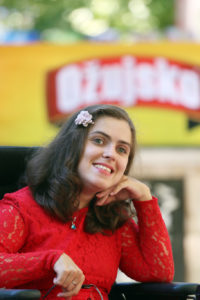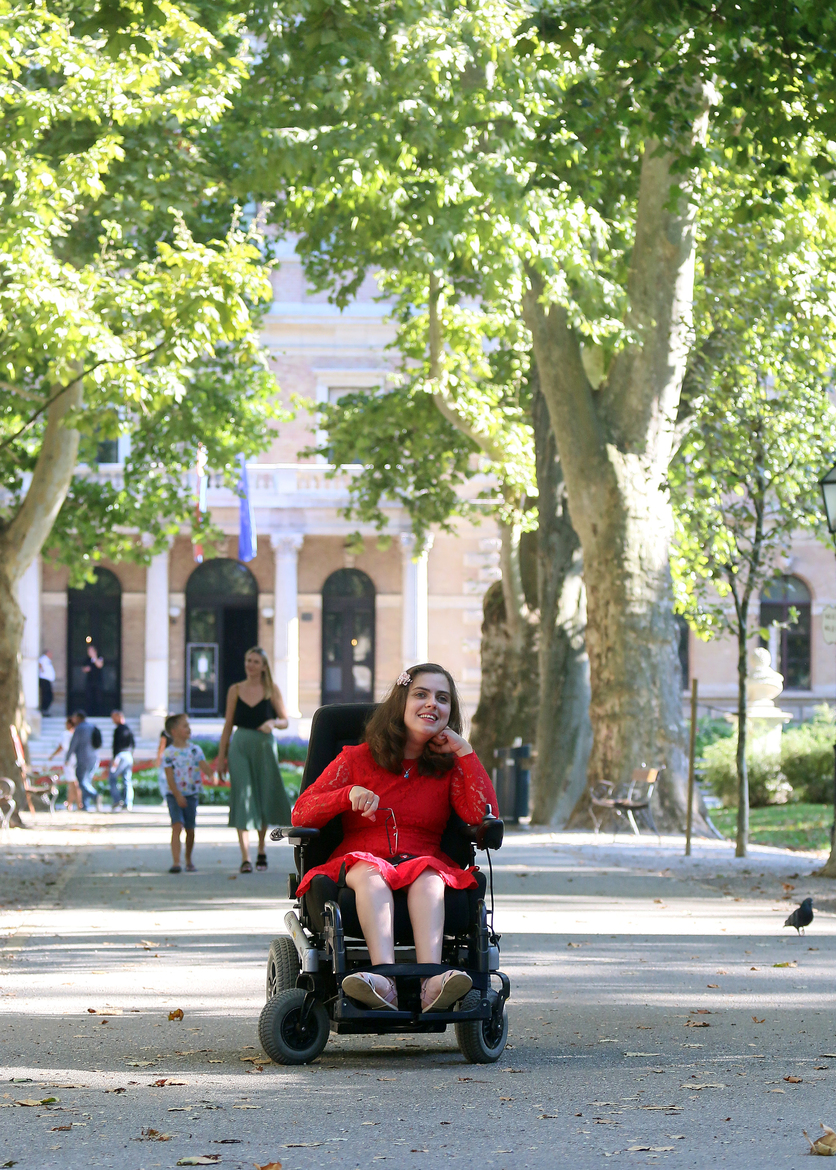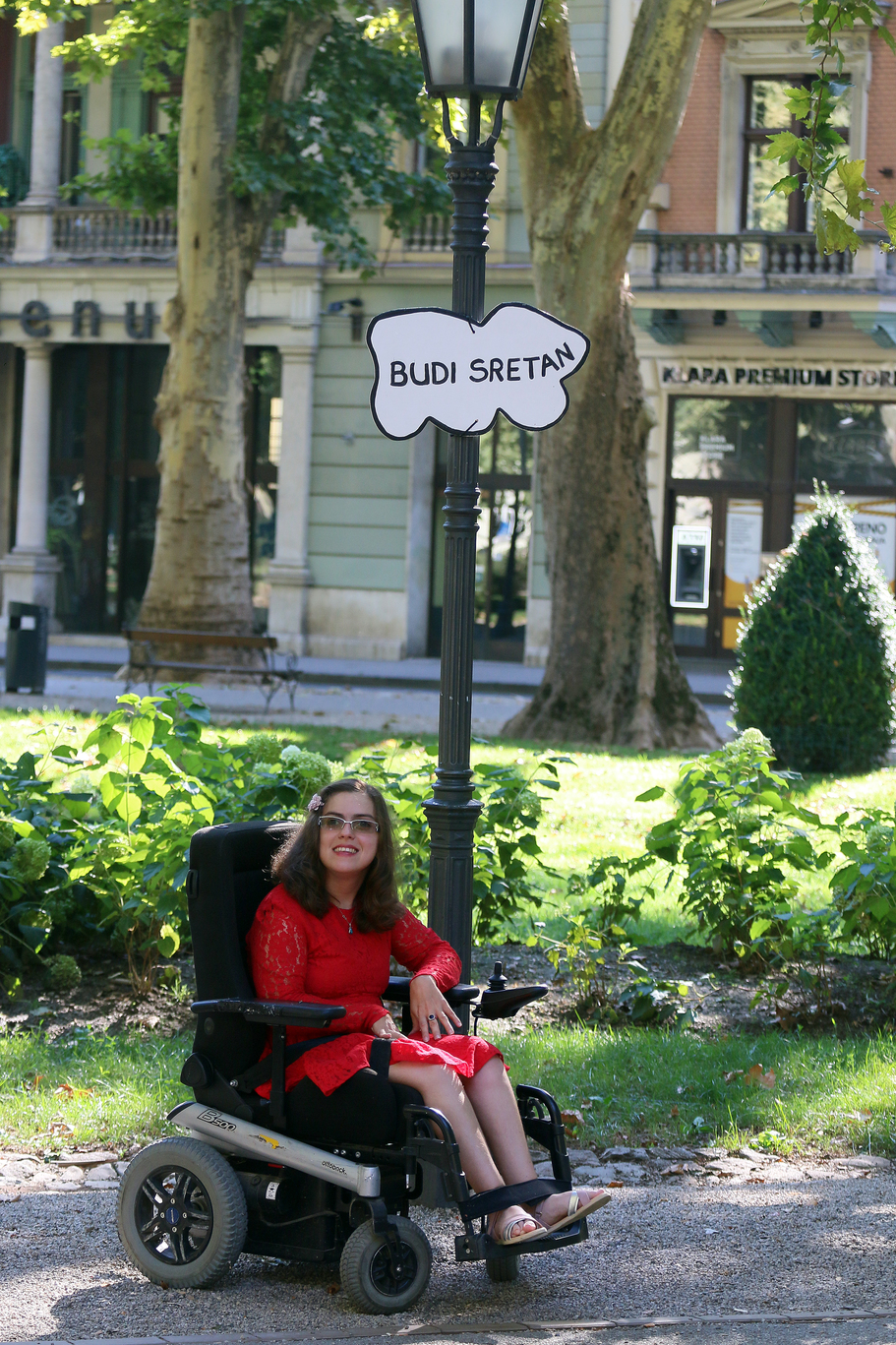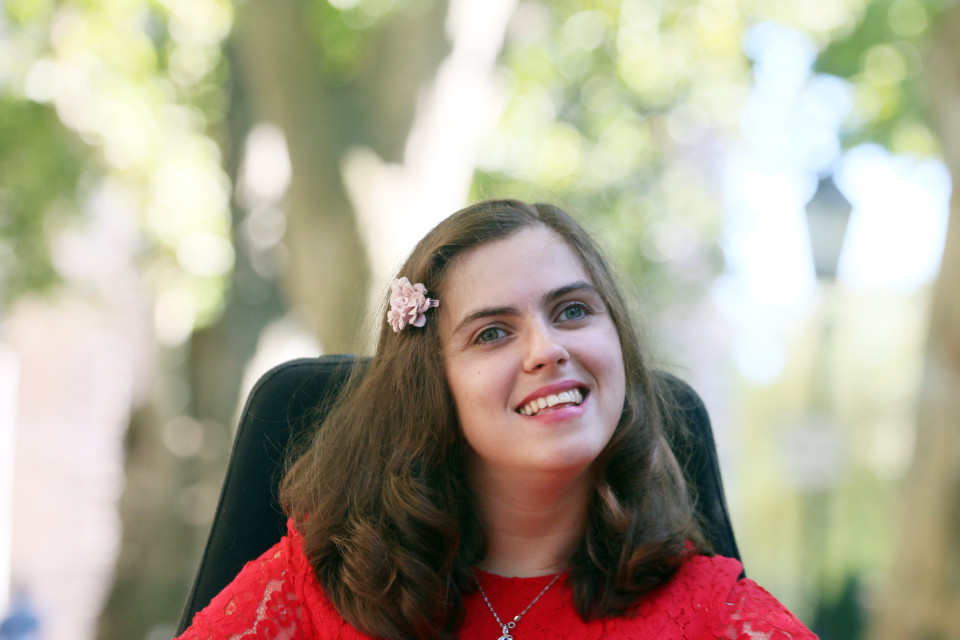M A R I J A
Zagreb | 2020

M A R I J A
City — Zagreb
Age — 29
Profession — Spanish and Italian teacher at a high school for students with physical disabilities
Love life — Single
Years in Zagreb — 6
Location — The uper town of Zagreb
T H E Z A G R E B S T O R I E S
‘I CAN’T
DOESN’T EXIST
TO ME’

- What makes you happy? “My job. I teach Spanish and Italian to students with disabilities. It’s a demanding job, but I learn a lot about various types of disabilities, and that makes me a better person. I myself have cerebral palsy; I can’t walk without assistance and have motor problems. I never had an issue with my disability and always accepted it, because my mother told me I was just like every other child. I never felt different, because no one treated me like I was different. Obviously, people notice that I have a disability because I’m in a wheelchair, but they always behave. I guess I’m lucky. I’m happy to be teaching Spanish and Italian, I’m especially crazy about the Spanish language and Spanish-speaking countries. My passion for Spanish began when I was very young. In 1995, Croatian television started broadcasting Mexican soap operas, and my mother and grandma used to watch them. That’s how I picked up the language. I was only five years old when I said to my mother, ‘Mom, one day I want to be a Spanish teacher.’ Later, I did go to university to study Spanish, and Italian. My dream was to become a Spanish and Italian teacher at my own high school. Last year my former teacher retired, and I got the job!”
- What is your best personality trait? “I’m very persistent. I can’t doesn’t exist to me. There are many ways to achieve something. No, I can’t walk, but I can take a stroll in my wheelchair on my own, just like other people. I wanted to study in Spain, so I applied for an Erasmus scholarship. I was the first disabled person from Croatia to receive it, and it took a lot of effort to make things work. I had to arrange everything myself, from finding a flat in Spain to looking for an assistant. Now I’m making plans to fulfill my ultimate dream of visiting Mexico, the country that awakened my love for the Spanish language. My mother will join me, not only because I need her help with getting showered and dressed – in Zagreb I have personal assistance for four hours a day – but also as a way to say thanks for everything she gave me. When my father died of a infarct when I was four years old, my mother was left behind with three children. Her own mom had died two weeks before my father passed away, so she didn’t have anyone to help her. It hasn’t been easy for her, but she did it. My mother is my hero. I should tell her that more often.”
- What makes you different from other people? “My persistence. I hate it when other people in wheelchairs accept things so easily. Sure, life isn’t easy for us and we face a lot of difficulties, but we must persist. When somebody says no, I will find a way to turn it into a yes. We are all responsible for the quality of our own lives.”

- What is your greatest struggle?
“I struggle a lot with technical obstacles, like trams without ramps, houses without a lift and shops that I can not enter by myself with my wheelchair. I don’t have a problem with my disability, but I do take issue with technical problems that make my life difficult. Or with people – especially from the government – who just don’t try to understand us, often because they are afraid of the unknown. I can get truly angry and disappointed when the state doesn’t provide us with what we need. There are a lot of things we must change, but it takes time.” - What is your greatest life lesson?
“If you want to follow your dream, be persistent. People can be lazy. It’s easier to say ‘I can’t’ than to put in the work and find a way. I’m often lazy as well, but then I say to myself, ‘You must do it, this is about your life.’ I get so angry when I want to go to work and a bus without a ramp shows up. I’ll be like, ‘O God, now I can’t go to work. Why? Why?!’ But then I remember that I can’t give up, because I’m responsible for my own life.” - What is your greatest sadness?
“That my father passed away. On the whole I’m happy because I manage to accomplish the things I want, but this is the one thing I can’t change. And it hurts. I miss him, I wish he never died. I wonder what he would say about my dreams, like going to Mexico, or what we would do together. I constantly think about those things, because he died when I was so little and we hadn’t had much time together. I remember that he always went for a walk with me and told me that I was his little honey.”
- What is the best advice anyone ever gave you? “That you can accomplish whatever you want. When I was little, I hated physical therapy. But in high school I had this really strict therapist who told me, ‘Stop saying “I can’t”. It doesn’t exist.’ That advice changed my life completely.”
- What is your biggest fear? “I tend to fear new things, but once I face those fears, they’re not scary anymore. For instance, soon I’ll have my own class at school and be the main professor. It’s a difficult job because not all of the children are able to follow all the programs – some of them have mental issues as well. I’m scared of making mistakes, although I know they are part of life, and I’m doing my very best.”
- What is the best thing that ever happened to you? “Six years ago, I got to spend a year in Madrid. I was so excited; for a while I couldn’t sleep. I adored it there! The Spanish world is my world. I would like to visit all Spanish-speaking countries, I hope one day I can make it happen. Even though I love my life and job in Croatia. I would even say I live for my job.”
- What are you insecure about? “My future, because there are a lot of things for which there are no global solutions for now. I’m not sure if there will be an adapted flat available for me, et cetera. It’s something that scares me, but I know I will find a solution.”
- What can really hurt you? “When people don’t understand me. Like when my mother wanted my father’s pension to be transferred to me. In Croatia, there is this regulation that if you want to receive someone’s pension, doctors must write a letter that you can’t work and didn’t go to school. I didn’t want that, but my mother thought I was being silly, because it would mean financial security for me. There was a difficult period where I wasn’t sure whether my mother would continue with this or not. It hurt that she didn’t understand how that letter from the doctor would have taken away everything that I am.”
- What does Zagreb mean to you? “Literally freedom, because I came to live in Zagreb when I went to university. Going to the city by myself in a wheelchair was something completely new to me. When it turned out it was something I could do, I started to do more things by myself. Now my job and friends are in Zagreb. I love going for a stroll down the streets, the city is so beautiful. Every part has its own story. The people in Zagreb are beautiful as well, they’re friendly and like to help each other, even tourists. And we love our traditions, we are proud of them. I’m happy that Zagreb is much more wheelchair-accessible than other Balkan cities. We can still improve things for people in wheelchairs, but they are a lot better than when I was a little girl.”
Photos by Sanja Koblar

